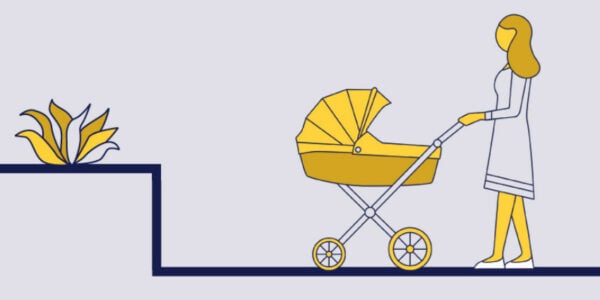New research has revealed that mothers in England and Wales who appear in a first set of care proceedings still have the same probability of returning to court for subsequent (recurrent) proceedings as they did when earlier benchmark studies were carried out in 2015, 2017 and 2020. Almost a decade on from the first study on recurrence, approximately one in four mothers are still at risk of returning to court. In addition, the actual number of mothers in recurrent proceedings has markedly increased since earlier studies, because more families are appearing in care proceedings.
Since the publication of the first research into recurrence, a range of intensive, therapeutic preventative services have been developed for women who appear in recurrent care proceedings (and increasingly their male partners), to help them stabilise their lives, address histories of trauma, and engage with physical, sexual and mental health services. Evaluations show these services have had a positive impact – however, there are relatively few of them available*, access to them is unevenly spread, some have closed due to insufficient funding or budget cuts, and many have small teams providing support to only a limited number of women and men.
Research published by Nuffield Family Justice Observatory and carried out by the Family Justice Data Partnership – a collaboration between Lancaster University and Swansea University – infers that the level of support available is insufficient to meet the need.
It unveiled that approximately one in four women involved in an initial set of care proceedings are at risk of returning to court for recurrent proceedings within the following 10 years. The findings are largely consistent with earlier benchmark reports from 20151 and 20172 for England and 2020 for Wales3. The study was based on mothers who appeared in care proceedings in England and Wales between 2011/12 and 2020/21, either with a new child, usually a baby**, or the same child.
The research also revealed that few babies involved in first repeat proceedings in England will ever return to their parents’ care. A high proportion (38.6 per cent) of cases resulted in placement orders, indicating a plan for adoption. Very few (12.7 per cent) resulted in supervision orders, typically made when children return to their parents’ care.
Furthermore, the risk of mothers returning to court is higher if the first set of proceedings results in a plan for adoption. In these cases, 34 per cent of mothers in England and 31.1 per cent in Wales are likely to return within 10 years***.
The study also unveiled that after a first return to court, the risk of another return increases. In England and Wales respectively, 33 per cent and 26.9 per cent of mothers who experience a first repeat appearance are at risk of a second within 10 years.
To date, much of the published research literature on care proceedings has not distinguished parents in terms of age. This study found that the risk of returning to court within a 10-year period is higher for mothers who first gave birth when young – increasing from one in four to one in three. A high proportion (41.8 per cent) of mothers appearing in recurrent care proceedings with a baby in England and Wales were estimated to be 14-19 years old when they first gave birth. In the general population of England and Wales, the mean maternal age at first birth ranged from 29.7 years in 2011 to 30.7 years in 2020 (ONS 2020).
Regional differences in recurrent proceedings were also examined for the first time, for mothers returning to court with a new child. In England, there is a divide between London and the South, and the Midlands and the North, which corresponds with related research on newborn babies in care proceedings. The starkest differences were found between London and the North East.
Lisa Harker, director of Nuffield Family Justice Observatory, said: “This study indicates that vulnerable women – who have experienced the trauma of care proceedings, and in many cases the removal of their children – are still not being adequately supported to make positive changes and rebuild their lives. Despite almost a decade of research into recurrence and associated innovation in services, not enough has changed for these women. They are not even being given a fighting chance of avoiding further proceedings. While ground-breaking support services are available – without which the number of mothers in recurrent proceedings would undoubtedly be higher – they are only meeting a fraction of the need. This situation won’t be helped by austerity measures threatening to limit public services even further.
“What is particularly worrying is that a large majority of women involved in recurrent proceedings are teenagers. They are likely to have a significant need for support; they will be poorly prepared for motherhood, both emotionally and financially, will have their own development needs, and might have been in care themselves.”
Professor Karen Broadhurst from Lancaster University said: “Our research team first uncovered the scale of recurrent care proceedings in 2015. Very welcome practice developments have followed, exemplifying the best of relational practice. However, new statistics indicate much more needs to be done if we are to provide all mothers in care proceedings with the opportunity to overcome the many hardships that characterise their lives. I am particularly concerned about the age profile of the young women in care proceedings and their life chances beyond care proceedings, given the highly stigmatising and isolating experience which is child removal.
“The best efforts of practice pioneers are currently compromised by short-term skeletal funding due to a lack of political will to invest properly in the lives of the most vulnerable. I fear the outlook is gloomy, given acute inflationary pressures on families (such as food and energy) and no material uplift in funding for children’s services in the face of increasing need. These twin pressures will be faced most severely in the most deprived communities, which are concentrated in the North.
“In a context of competing imperatives on public service budgets, the lack of progress in collecting and collating robust evaluative evidence at a local level is also concerning. We know great work is being done at a local level, but there is insufficient pooling of evaluative evidence about prevention at a national level. This means it is hard to ‘catch the ear’ of national policy makers on behalf of vulnerable mothers, in the face of multiple national crises.”
The research was based on full-service population data produced routinely by Cafcass and Cafcass Cymru. Anonymised, individual level records were accessed via the SAIL (Secure Anonymised Information Linkage) Databank located within Population Data Science at Swansea University Medical School.







